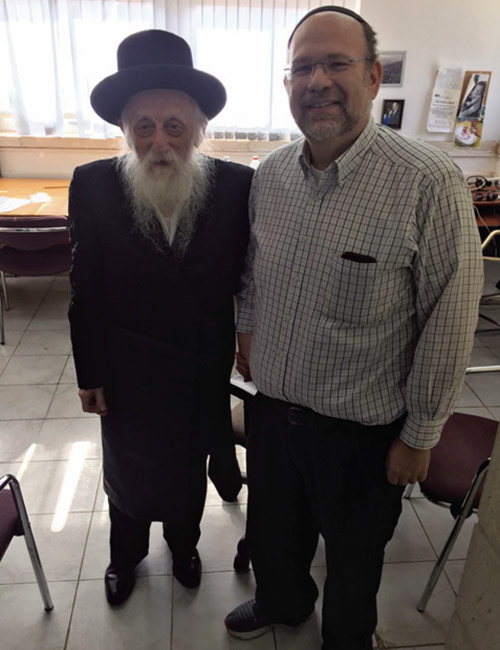


(Courtesy of Lema’an Achai) Lema’an Achai’s ambitious mission, since opening our modest doors in 2000, is to help people in need in such a way that they will no longer remain needy. As poverty is complex and multifaceted, so is our work. Combatting the various domains affected by need—emotional, communal, vocational, relational, financial, physical and cognitive—we call it holistic. Or, in the mama loshon, Smart Chesed. The composite stories below disguise the identifying information of families we’ve assisted to protect their confidentiality. The processes described, however, are true to life and articulate a highly accurate depiction of the long-term, day-to-day work we do with our clients so that they and their children and their children’s children have a real chance of breaking out of the shackles of poverty.
Shayna and Menachem Tzaddik came to Lema’an Achai begrudgingly. They never wanted to be in a situation where they were asking for help. They had done everything possible to avoid anything of this kind. They studied. Worked hard. Were very careful with their money. Consulted with their rabbis and professionals. They could fathom no reason for their winding up in this situation. And if it wasn’t for their five children, they would never have asked for help. Out of sheer shame.
Elka, our intake social worker, assured them that they had done the right thing. She did her utmost to remove stigma and prejudice from the Tzaddiks’ hearts. Poverty can happen to anyone, and it does. Despite our best efforts. Regardless of our geography, our ethnicity, our upbringing. When it happens, there are things we can do to tip the odds in favor of it being short-lived.
Elka explained that Lema’an Achai is well-equipped with professionals who will work with them closely, intensively, over time, to get them back on track. In-house financial advisers, social workers, rights advocates, psychotherapists, vocational rehabilitation, dental clinic, moadonit after-school program for girls, remedial tutoring, food vouchers, loan gemach, big brother/sister mentoring, holiday assistance, illness and grief counseling and many more programs—all specifically designed to strengthen clients and help them get back on their own feet.
The Tzaddiks remained hesitant. “We don’t think all of that will be necessary. This is just a minor setback. We’re sure if you just help us with a couple of bills we’ll be able to handle it from there.” Elka explained that Lema’an Achai doesn’t really work that way. Sure, as members of the community they are welcome to take out a no-interest loan from our loan gemach, but typically by the time families come in for help there are numerous issues that have accumulated, so a lack of money is not the only problem. “We have a lot of experience doing this. And a dedicated professional staff here to support you through this process. No judgment, no intrusiveness, no overbearing control. Just caring, knowledgeable support to help you realize your potential.”
That was almost two years ago. Today the Tzaddiks have a much more solid footing. While not all of their problems have been solved, many have: they have consolidated their debts to one manageable payment; they are communicating better and the atmosphere at home is warm; the children are studying well in school; they are earning more and able to cover their monthly expenses; and perhaps most importantly, their chronic stress has abated, they’re feeling more connected to the community and more optimistic about the future.
These effects are seen not only by us, but by the many families the Tzaddik composite is based on. The following are direct quotes from recent letters clients sent to our staff:
“I just wanted to share with you my incredible gratitude to Hashem and to you and Lema’an Achai, for holding my hand and supporting me through really hard times and helping me to rebuild my life again.”
“Thank you so much for helping me this year. To get back on my feet with dignity. I feel you are always there for me. May Hashem repay you in every single way.”
“I want to say thank you to everyone at Lema’an Achai for the heartfelt aid and support. For the warm, personal attention, the empathy and sympathy. Thank you from the bottom of my heart. For the listening, the quick replies, the cheerful responsiveness, for the knowledge and professionalism. Thank you for everything!”
Founded in the year 2000 by a group of concerned citizens, Lema’an Achai is rooted in Judaism’s communal responsibility for charity and chesed.
Lema’an Achai empowers rather than entitles. By providing the less fortunate with the tools they need to break the cycle of poverty, our unique approach—Smart Chesed—facilitates growth leading towards self-sufficiency. We strive to help our neighbors the way we would want to be helped: as equals, with the aim of getting us back on our feet.
Receiving a handout—even when asked for—can often feel belittling. In contrast, when financial support is complemented with education, supportive guidance and training it conveys a palpable message of appreciation, commitment and hope: “You are going to make it!” We call this Smart Chesed.
Money is undoubtedly a serious part of the problem of poverty, but typically it is only a small part of the solution. While not having enough funds to provide for the basics in life is certainly excruciating and worthy of alleviating—it is critical to offer rehabilitative assistance as well. We believe this is not only more respectful, and more effective in the long run, but also the Jewish way, in accordance with the eighth and highest level of charity the Rambam teaches us.
Lema’an Achai’s systematic intervention incorporates more than 30 remarkable programs that address the causes of poverty at their roots. These programs are divided into three categories: rehabilitation and therapy; direct material aid; community crisis prevention. This combination provides a comprehensive, holistic formla to help our families through, and then out of, crisis.










